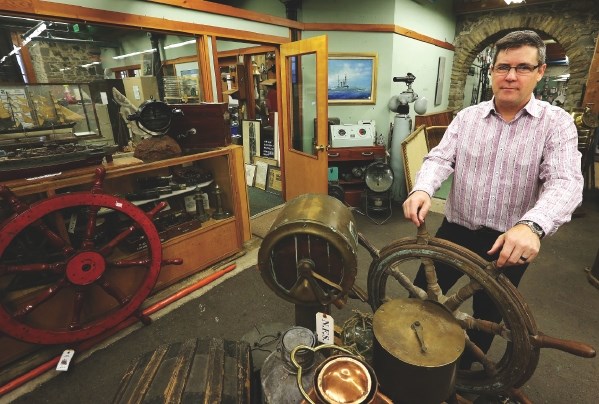Capital Iron’s diverse inventory — from hardware and kitchenware to antiques, clothing and outdoor gear — helps tell the tale of a business that has continually reinvented itself over its 80-year history.
“The store has grown and evolved and now we sell everything from hammers to hot tubs,” says store owner Mike Black. “We’ve always had the reputation that says you never know just what you’ll find in here.”
Capital Iron, which began in the scrap-metal business reflected in its name, has gained its reputation by widening the range of the items on its shelves as it adapted to the changing times. Even now, the company is planning an expansion into Langford, bringing the number of its outlets to three, with downtown Victoria and Sidney.
Capital Iron’s original building, at 1900 Store St., predates B.C.’s 1871 entry into Confederation, going back to 1863, when it was built as a warehouse, part of a dock and sales area.
 |
|
Click on the cover to |
Ships unloaded goods to be sold or stored for a brief time before they were moved from the harbour. Similarly, Victoria and Vancouver Island businesses would transport in goods to be stored in the warehouse until they could be shipped out.
In the late 1800s, the warehouse became the Victoria Roller Flour and Rice Mills. Rice would be shipped in from Asia, processed in Victoria and sold, largely to feed Chinese labourers constructing expanding railways.
But the Canadian government worried about competition for newly settled Prairie wheat farmers and put a tax on unprocessed grain, including rice. In 1897, the Victoria Roller Flour and Rice Mills went bust. Another rice and flour mill moved in, but it also closed within a few years.
The building stayed mostly empty for 17 years until 1934, when Morris L. Greene created Capital Iron and Metals Ltd., a business first specializing in scrap metals taken largely from marine salvage.
This connection with scrapping ships explains the marine artifacts in the basement level, which Black hopes to turn into a small museum.
But Greene was obviously a nimble-footed businessman. He sold things such as textiles, even men’s suits, during the Great Depression.
In 1945, the Second World War ended and, as the Navy reduced in size, warships became increasingly available as scrap, providing steady work for Capital Iron.
And at the same time, large amounts of military surplus became available. Greene quickly became known as a war-surplus dealer, offering uniforms, boots and other military gear.
Ron Greene is Morris’s son and Black’s father-in-law. He’s retired from the store operation, but still owner of the Store Street land and building.
He says the story of the “two-foot screwdriver” explains the company’s move into retail. Family lore says that Morris received a big load of giant screwdrivers that were originally meant for working on military radar gear but became redundant as radar equipment became smaller. Customers asked for something smaller.
“So Dad started bringing in regular lines of screwdrivers because not everyone wanted a screwdriver that was two feet long,” Ron Greene says.
Morris died in 1972 at the age of 71, and Capital Iron ceased to break up ships and switched completely into retail.
Black became part of the Capital Iron story in 1987 when he married Ron Greene’s daughter, Eveline. The following year, Black left the Navy to work for his new father-in-law. “My goal in the Navy was to be captain of the ship, and now it’s a similar thing, only it’s a different ship,” says Black, 53.
He is now deeply involved in planning and getting ready to move into the new West Shore store on Langford Parkway, in the former Sandy’s Furniture location. Black said the new 23,000-square-foot Langford space will offer the same kind of eclectic shopping experience as downtown’s 40,000 square feet.
It may not be the company’s final expansion, either. Black said he has taken calls from Duncan, Nanaimo, Courtenay and even the Interior from property owners seeking Capital Iron as a tenant.
Black is proud of Capital Iron’s operation, whether it’s the employees, who will number 110 when the Langford store opens, or the relationship with the surrounding community and its reputation and community involvement. But he is also proud of Capital Iron’s unique store character. “I can’t think of anywhere else in the world that I’ve come across in my travels that has a mix like us,” he says.
